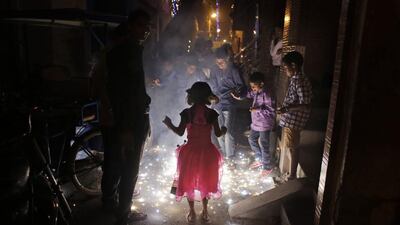Throughout my childhood in Chennai, my family’s ritual on the morning of the mid-autumn festival of Diwali never varied. Up at the crack of dawn, a shower and a prayer, sets of new clothes and then out to our apartment building’s terrace or courtyard to light an assortment of fireworks.
For decades, the evenings and mornings around Diwali, which falls on October 19 this year, played out with an identical soundtrack across India: the rat-a-tat-tat of mildly explosive fireworks, the whoosh of bottle rockets and their soft pops in the sky, the fizz of Catherine wheels and the crackle of hand-held sparklers.
This soundtrack had been getting quieter in recent years; my family and friends buy perhaps a tenth of the fireworks they did in the 1990s. But this Diwali will be especially muffled. Concerns about air pollution, stricter regulation of fireworks factories and this year’s newly introduced sales tax have all led to far fewer fireworks being bought and to markedly decreased production in Sivakasi, the Tamil Nadu town where roughly 90 per cent of India’s fireworks are manufactured.
The slow disappearance of fireworks from Diwali is bittersweet. It’s impossible to disagree with the fact that fireworks ruin the air; for days after the festival, the smell of burnt gunpowder made us cough and a haze hung around the city. The regulation of factories, too, has helped reduce child labour and improved safety standards.
But the decline of the tradition — which has been linked to Diwali for 300 years or so — still feels regrettable. It wasn’t just the children of our family who looked forward to the thrill of the fireworks, it was the adults as well, who recollected their own childhoods in the process.
________________
Read more:
Explosion at India fireworks factory kills at least 25
India capital chokes on toxic smog after Diwali
________________
This year, Sivakasi’s 700 fireworks factories have slashed production 25 to 30 per cent below last year, said J Tamilselvan, the president of the Indian Fireworks Association, which is based in Sivakasi.
“People have been buying fewer and fewer fireworks every year anyway, for the past few years,” he said. “But this year, the government’s policies have hit us hard.”
A new goods and services tax, introduced this past July, levies a 28 per cent tax on fireworks — a regulation that led to a minor storm of protest earlier this summer. Previously, fireworks manufacturers paid only 14.5 per cent as tax.
“If the tax goes up, we’ll have to raise our prices, which means fewer people will want to buy fireworks,” Mr Tamilselvan said. “We sell fireworks once a year, really, during Diwali. What was the need to tax us so heavily?”
Making matters worse for the industry, the judiciary has become more active in restricting the sale and manufacture of fireworks. Last November, the Supreme Court suspended all sales licenses for fireworks in Delhi because they worsened the capital’s already-miserable situation of autumn smog. In July, the court also banned the use of mercury, lithium, arsenic, lead and antimony in the manufacture of fireworks across India.
Last month, the court temporarily lifted its suspension of fireworks sales in the capital in time for Diwali. But it dramatically reduced both the quantity of fireworks that can be sold, as well as the number of vendors permitted to sell them. This Diwali, Delhi will only be able to let off 5 million kilograms of fireworks — half the weight let off last year when there were no restrictions.
Sivakasi’s manufacturers, like many other small businesses across India, also suffered from demonetisation — the sudden move last November by prime minister Narendra Modi to withdraw high-value banknotes to handicap hoarders of illegally-earned or untaxed cash.
________________
Read more:
India tradition of multipartisan iftars in danger of vanishing
Ramadan in Old Delhi: India's oldest mosque bursts into life as the sun sets
________________
Demonetisation sent shock waves through the Indian economy. Bank loans shrank and many customers who ordinarily paid out large amounts for advance orders of fireworks — to use or to sell at retail — decided to delay or cancel their orders. As the economy has slowed down, household budgets have become leaner.
Manufacturers also face competition from Chinese-made fireworks, which have increasingly begun to be sold in India over the past five years. Imports are prohibited under law, because the low-cost Chinese fireworks are unstable and poorly made. But customs authorities have repeatedly impounded millions of rupees worth of fireworks being smuggled into India and there are likely many consignments that make it past this hurdle.
Without doubt, the dwindling use of fireworks makes for a cleaner Diwali. The air is breathable in the morning and there is less paper detritus left over from exploded fireworks littering the roads.
But a twinge of sadness is unavoidable. Two years ago, my sister’s young sons had their first real experience of fireworks. We gathered on the terrace, as always, and they held sparklers in their hands and watched their parents let rockets into the sky. The delight and wonder on their faces reminded me of how I’d felt during my own childhood. But by the time these boys go on to have children of their own, I doubt there will be bottle rockets or Catherine wheels in the market to buy.

